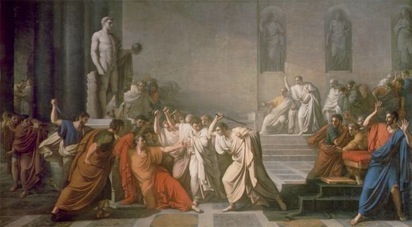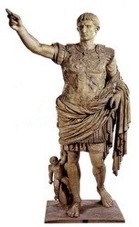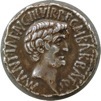Birth of Empire





In 43 B.C., Octavian, Marcus Antonius (Marc Antony—one of Julius Caesar's top lieutenants) and another Roman General, Marcus Lepidus, formed the second Triumvirate to rule Rome. After taking power, the Triumvirate proscribed and slaughtered thousands of political enemies, firmly establishing their control of the Roman government. After two battles at Philippi in Macedonia, the last of Caesar’s assassins, Brutus and Cassius, now defeated by the forces of the Triumvirs, committed suicide (42 BC). After the battle, a new arrangement was made between the members of the Second Triumvirate: while Octavian returned to Rome, Antony went to Egypt where he allied himself with Queen Cleopatra VII, who was the former lover of Julius Caesar and mother of Caesar's infant son, Caesarion. Lepidus went on to govern Hispania and the province of Africa.
In 40 B.C., Antony married Octavia, Octavian's sister, and later deserted her for Cleopatra, Queen of Egypt. When Antony gave Roman provinces to his children by Cleopatra, Octavian declared war on Antony. In 31 B.C., off the coast of Greece near Actium, the Roman Navy under Agrippa defeated the combined fleets of Antony and Cleopatra, and within a year both had committed suicide.
In 27 B.C., the Roman Senate granted Octavian the name Augustus, meaning "the exalted." They also gave him the legal power to rule Rome's religious, civil and military affairs, with the Senate as an advisory body, effectively making him Emperor.
Augustus Caesar was the most important man in Roman history. He maintained control of the Roman State for the rest of his life. He was dominant from 30 B.C. to A.D. 14. During those 43 years he reorganized the Roman government to give permanent control to one man. He was the first Roman emperor. Augustus used military power to have himself put in charge of the old city-state government of Rome. He gained control by combining many powers of the old magistrates, consuls and tribunes into the largely informal and unofficial role of first citizen.
In many years, he served as one of the consuls himself; and he got the Senate and Assembly to give him the power of a Consul even in years when he did not actually hold the office. There continued the to be regular consuls as well. But because consuls had to agree, he was able to prevent the actions of the other consuls whenever he wanted. He was also given the power of the censor, which enabled him to control who would be Romans citizen and who would sit in the Senate.
He was also given the power of a Tribune of the people as well. He could use his tribunician power to block any undesirable action of the Senate. Moreover, all Roman leaders had to swear an oath that they would not harm a Tribune in any way. In all of these offices Augustus did not rule alone. Besides him, there were regular consuls, tribunes, censors etc. But his prestige and his military support enabled him to control who would be elected to serve in office with him. Moreover, since he held all of these jobs of once, he had more auctoritas than any other Roman. In theory, he was elected to all of these offices, although the election was, in reality, only a formality.
These measures gave Augustus control over the government in Rome and Italy. But it was also necessary for him to have charge of the areas under Roman rule outside of Italy. This was especially important since control of the provinces also brought with it control of the army. During the period before 30 BC, the proconsuls or governors of the provinces had increasingly become the main Roman generals. There was little fighting to be done in Italy, and the consuls had to stay there and run the central government. But on the fringes of Roman territory, war was more likely; so that the proconsuls did more and more of the fighting. This was dangerous because it permitted the governor like Julius Caesar to gather an army to overthrow the government in Rome. Augustus knew that he would have to control the governors if his own position in the state were to remain secure. He had a brilliant idea of how to do this.
Traditionally the Senate had chosen the governors. But Augustus had the Senate divide the provinces into two groups. In the older provinces which were less likely to encounter trouble, he allowed the Senate to appoint Proconsuls as it always had an. Since he had the power of consul, he could occasionally check on those proconsuls; but he rarely had to supervise them. Their armies were very small so they posed little threat.
In the newer provinces where the possibility of war was more likely, Augustus made himself proconsul. He was governor in more than half of the Roman provinces. He appointed assistants called legates to go out and rule the provinces for him. The legates were responsible to him and he could remove him from office any time he wished. They could not fight without his authorization.
Through this device, Augustus was able to keep control over the army. After the Civil War was over, he reduced the size of the Roman army from around 700,000 men to 350,000. Then he divided the army into small groups. Most of the forces were assigned to the provinces where he was governor. There were only a few soldiers stationed in Italy to guard Rome and to insure that Augustus would not be challenged there. No one of his legates had enough men to threaten Rome seriously, and they could not increase the size of their armies without the emperor's approval. If a large army was needed to fight in any one place, Augustus would either take command of it himself, or he would turn it over to a reliable person like a close friend or relative. Moreover he was recognized as the commander all of the soldiers, and they were required to take an oath of loyalty to him. Their pay and bonuses all came from him, so Augustus was the patron to the entire Roman army. These arrangements enabled Augustus to control the Roman military, and also to control corruption in provincial government.
Perhaps the most remarkable thing about Augustus' reorganization of the Roman state into an imperial government is that it was generally accepted by the Romans as a desirable arrangement. One reason for this is that Augustus did not abolish any of the older offices or organs of government. He allowed them to continue, but only under his close personal supervision. It was important that they should continue because the Romans placed a very high value on the honor which derived from holding offices and from sitting in the Senate.
We saw earlier that the honors for military victory and office holding were one factor in promoting Roman expansion. The honor of being consuls, being a governor, or being a Senator was still available – but only for those who supported Augustus. He could control who was selected for offices in Rome or in the provinces. As censor Augustus could decide who would be in the Senate. Moreover, Augustus used this control to get the support of men who would cooperate with him. Members of the traditional families had to accept this arrangement in order to advance in politics. Augustus also allowed some equestrians to gain high positions in government. He also promoted men from other parts of Italy who had only recently received Roman citizenship.
Augustus created and organized a powerful political machine with himself as the boss at the center of Roman political patronage. But Augustus did not flaunt his great power openly. He tried to preserve the appearance of the older form of government. His power was made to appear legal. He received all of his offices from the Senate and Assembly. All future emperors had to receive their power to same way. In theory, emperors were elected; they were not hereditary monarchs. In practice, of course, the election was a formality. A smart ruler could see that a brother or son was elected to succeed him. In addition, Augustus did not assume the trappings of a king or dictator. He did not wear special clothes, nor did he have special titles. Our word "emperor" comes from one of his titles--"imperator." But any Roman general might hold this title. His favorite and most important title was that of princeps, and it was very modest.. This title had been traditionally granted to the most distinguished member of the Senate, and it simply meant first citizen. Modern historians like to call the government of Augustus, the principate.
Thus, with Augustus, the Roman government ceased to be a city-state government or republic and became an imperial government run by one man. Given our own ideas about democracy, we tend to see the appearance of absolute government by one man as a bad thing. But we should remember that the Roman government had never really been very democratic. A few highly placed distinguished Roman families had dominated it. In a city-state government nothing else was possible. Most persons under Roman rule really enjoyed only civil rights, and those civil rights were not seriously eroded of the founding of the principate. Moreover the dominant Roman families that were affected by the establishment of the empire had long since shown that they were not capable of providing efficient government for their empire.
We should also bear in mind that Augustus created a stable system of government that with only a few lapses, lasted for nearly 400 years and a Roman peace that lasted nearly 300, and that hasn’t happened very often in history.